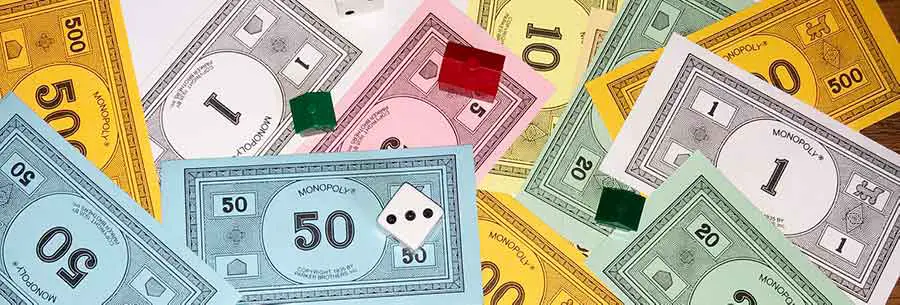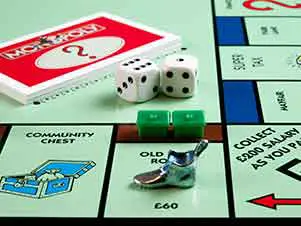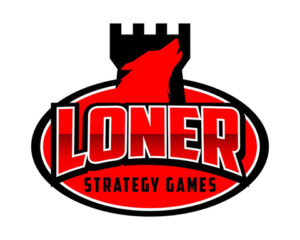
Monopoly is a board game sold by Parker Brothers and meant to be played by two or more players. Playing it as a one-player game can be problematic at best. Here are some rule changes that will make it work.
You can play the board game version of Monopoly a couple of ways. Set a time limit and amass as much wealth as you can. Play until you accumulate a set amount of wealth or assign different strategies to each token. You can also play Monopoly alone on PC, Playstation, Xbox, Ninetendo Switch, or even on your phone.
Affiliate Link
Affiliate Link
Affiliate Link
Assuming you want to play the board game by yourself instead of the PC version, here are some game variations that will help.
Here’s a short one-token version. Start the game with just $100. The bank pays you the rent if you land on a property you own. Set either a 20 minute time or 20 turn limit (you can vary that according to your personal tastes). When you either go broke or the turn/time limit has been met figure up all your assets and keep track of it. The next time you play try to beat that score.
Read More: Can you actually make that expensive gaming habit pay for itself?
Here’s another one-token version but it eliminates virtually all the strategy from the game, whoever wins will be determined almost entirely by luck if you decide to play it with more than one token.
You can roll as many doubles in a row as you want without going to jail. Nice if you happen to be one of those lucky players who rolls a lot of doubles.
When you land on a property you have to buy it if you can afford it, no mortgaging a property to use as a source of income to buy a property is allowed. You can mortgage a property for other things, like paying rent or buying houses for another property group. Selling houses and hotels to buy property isn’t allowed and neither are auctions.
Whenever you have the cash on hand to unmortgage something you have to, and if you have the ability to buy a house (if nothing is mortgaged) then you have to.
You win when you collect a set amount of assets, like $2,000 or $5,000, the amount is up to you, or you could set a rounds/time limit. To make this version a little more interesting and fun you could play with several tokens all playing by the same rules. The first one to the set amount of wealth wins. To make it even more fun you could play as one of the tokens since there is not much subjectivity to this version of the game.
In this multi-token version at the start of the game you can use as many tokens as you want, but keep in mind the more you use the harder it will be to manage the game. The game is played the same as a game with more than one player except:
There is no trading of any kind. After all, you might give preference to your favorite token over the others making it an unfair game, assuming of course that you want a fair game.
If any tokens land in jail they cannot pay their fine and get out. They stay there for three turns or until they roll a double. That prevents $50 from being spent unfairly.
If one of the tokens goes bankrupt return all the properties it owns to the bank. The remaining tokens are free to buy them.

There are no auctions. When you land on a property the token must buy it unless it can’t be afforded.
To make a game shorter it can end when one of the tokens goes bankrupt. Add up every token’s cash, full value of houses and hotels and deed cards. Deeds that are mortgaged are only worth half the face value of the deed card. The token with the most money wins.
To make it a little more interesting but maybe a little less fair to all the “players” you can assign each one a specific strategy. There are four main strategies to use, plus you can play as yourself, making this a five “player” game.
Token 1 could develop property as fast as it can. Buy everything in sight for as long as the token can afford it. When faced with a choice of building or buying, build first.
Token 2 could target orange and red properties. This token must buy a red or orange deed if it lands on it, even if it must mortgage or sell something else. If it can’t do that it must pay double rent to the Bank or, if unable to do that, it must go bankrupt.
Token 3 could aim for getting a monopoly regardless of the color. Once that’s done the token must place three houses on the monopoly as fast as possible. If the token has another monopoly it cannot add houses to it until it has 3 houses on each property of its first monopoly.
Token 4 could focus on buying up all the houses in the game, allowing it to outlast the other tokens. Don’t build hotels, just keep houses to block the other tokens from developing their property.
Token 5 is you, playing by whatever strategy you want to use. Not only will you have the fun of playing Monopoly by yourself, you’ll also develop skills and become a better player when friends come around to play.
The game ends when one token, or you, goes bankrupt, since it will probably be obvious who the winner will be, although you can play it out to the bitter end.
How To Play Monopoly With Two people
Playing Monopoly with two players, although the rules say you can do it, usually isn’t a whole lot of fun without a few rule changes.

One variation is to allow a player to buy a house for a property he or she owns it they land on it, regardless of whether he or she owns the entire color block or not. If the player lands on it again, and it already has a house on it they can buy another one, but that’s the limit without owning a monopoly for that color. Once someone owns the set the normal rules about houses apply.
Another option that will also speed things up is to shuffle all the unowned deed cards, take the top six from the top of the deck and place them in a row. Put one up for auction by rolling one die. For instance, if a 2 is rolled then the second deed in the row is put up for auction at the start of the player’s turn. This provides some unexpectedness and allows for some strategizing since everyone knows what the next property up for auction is. It also forces a decision about buying the property if you’re within range of landing on something you really want and can’t afford both. To make it even more interesting you could stipulate that the player winning the auction can’t buy the next unowned property they land on. Once the auction is over the player takes their turn.
A variation to the above rule is for a player to roll the dice and take their turn first. After finishing their turn, such as buying a property, the die is rolled to determine which of the six properties is auctioned, and then the auction is conducted.
Do you buy everything you can and run out of funds, only to see that property you need turn up and have your opponent buy it for a rock-bottom price, or do you hold back and lose some good properties to your opponent at a cheap price? Or do you hold out, hoping to land on that property you really want? Or do you win the auction, only to find out you can’t afford to buy that property you’ve dreamed of owning because you spent all your money at the auction?
Once a player’s turn is finished put the remaining cards on the bottom of the pile and put the next 6 in a row for the next player’s turn.
Another interesting twist would be to use the “Get Out of Jail Free” cards to put the other player in jail instead. Maybe not a game changer but it could be a lot of fun! When you get an “Advance to Go” card you could use it to “advance” the other player to jail instead. Could work well with a time limit game if you’re in the lead.
If you get the Chance card “Advance to Illinois Ave,” and someone else owns it, instead of getting rent they are forced to forfeit it and place it back into the unowned properties. Any houses or hotels on the property are lost. The player receives no reimbursement of any kind. If other red properties have houses or hotels on them, they can remain but no more can be added until the player recovers Illinois Ave. Most players like the red properties since they are landed on the most frequently, someone will think twice before acquiring Illinois Ave it there is the chance of taking a major loss for owning it.
For the Chance “Go Back 3 Spaces” card, if you end up on New York Avenue and you own it you can buy a house for it, even if you don’t own all the colors to the property. Limit of two houses.
For the Community Chest “Bank Error in Your Favor” card the other player gives you the $200 since the bank put it into their account by mistake.
House Rules That Can Make Any Monopoly Game More Fun
I’m sure most of us have done this at least once, and that’s adding money to Free Parking. Start by placing $500 in the center of the board. Any fees paid to the bank, like street repairs or fines, go into Free Parking instead of the bank. When someone lands on the Free Parking space they collect all the money. Once that happens another $500 is added to the center of the board from the bank.
Most of us have ignored or do not know about the auction rule. You can continue to ignore that rule or instead of having an auction make it a little punishing by not allowing the player who landed on it to buy it if they land on it again. Since that would be hard to keep track of you could limit it to one trip around the board.
Do you really want to grind your opponents into dust? Or give everyone a fighting chance? Allow two hotels per property instead of one. Houses can also be added one at a time using the price listed on the deeds, so a player could have a hotel and four houses on a property. Helpful if you happen to be an unlucky player who only got one or two monopolies. This will give you a fighting chance.
One real interesting rule I found while researching the Internet was using “movement” cards. Number 6 cards from 1 to 6. Roll one die and use a movement card for the other die. For example, if you roll a 6 you can use the number 2 movement card to move a total of 8 spaces. You can not reuse any movement cards until all six have been played.
Add some fun to owning Rail Roads. If you own two or more and land on one of them you can travel to the next railroad you own instead of rolling the dice on your next turn. To make it more fun, other players can do that too if they land on one of your Rail Roads, for a fee of course, on top of what they already owe you for landing on it! Two turn limit though or someone will do that forever, thus allowing them to avoid everyone’s houses and hotels.
Everyone starts out with 3 random property deeds. This gives you some objectives at the very start of the game and tends to shorten the length of the game as well.
You can build house and hotels on properties you don’t have all the colors to at double the price listed on the deed card. If they have to be sold they can only be sold at half the price listed on the deed card.
It only takes 3 houses instead of 4 to buy a hotel. This rule is mostly for shortening the length of a game.
Need help with Monopoly rules? Read the simplified version on our page about Monopoly rules.
Speed Die
Here’s a variation that can be adapted from the PC version of the game called Speed Die. Get a third die that is a different color from the other two being used, like 2 white die and one red die, so you can tell the speed die apart from the other two. After a player completes the first trip around the board the player can start using the speed die.
If a 1, 2, or 3 is rolled on the speed die it’s added to the total of the other two die. For instance, if a 5 and 6 are rolled on the white die and a 3 is rolled on the speed die the player moves 14 spaces.
If a 4 or 5 is rolled the player moves the number of spaces on the white dice and finishes the turn normally, then at the end of the turn the player goes to the next unowned property and either buys it or puts it up for auction. If everything is owned, then the player goes to the next property that the player doesn’t own and pays rent.
If a 6 is rolled on the speed die the player can choose to move the amount of spaces equal to what’s on one of the white die or use the total as usual. For example, if a 2 and 3 are rolled and the speed die is a 6, the player is allowed to move either 2, 3, or 5 spaces (you don’t add the speed die into the total).
Another special rule is if you roll triples (the same number on all 3 die). When that happens, the player can move to any space on the board. This modified version is not only fun, but it also greatly speeds up the game.
Other House Rules That Can Be Adopted From The PC Version
- When you land on the GO space you can either get $400 or move your token to any space on the board.
- When you land on a Chance space you do not have to draw a card.
- If you roll snake eyes (two ones) the bank pays you $1,000.
- Properties can only be bought through auctions.
- No rent collection while in jail.
Don’t forget to visit my YouTube channel at https://www.youtube.com/channel/UCcWU6qxVisK93h5guKRVtdg
Monopoly is a game that has existed since the Great Depression. It’s fun, and with the rules listed in this article can be played as a single-player game. It can also be a lot more interesting and much more enjoyable by using some alternate rules in this article.
